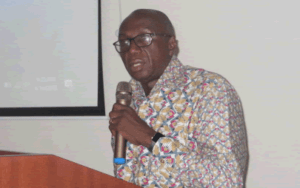Ghana is committed to reduce disasters – Minister

Mr Ambrose Dery, the Minister of the Interior, on Monday reiterated the country’s commitment to implement the priority areas of the Sendai Framework to build disaster resilience for the citizenry.
He said in consonance with, priority three, which required nations to invest in disaster risk reduction for resilience, “the nation is putting measures in place to mitigate the various hazards facing the country”.
Mr Dery said the Government had committed GH¢5.5 million in the 2018 budget for critical storm drain construction and dredging in areas such as South Kaneshie, Awudome and Adabraka-Odawna to direct outflows into the Odaw drain.
The Minister, speaking at a five-day Disaster Risk Reduction workshop, on the theme, “Building resilience of natural hazards in Sub-Saharan African regions, countries and communities”, said more of such initiatives would be implemented across the country.
The Workshop was organised by United Nations Office for Disaster Risk Reduction (UNISDR) in collaboration with National Disaster Management Organisation (NADMO) to discuss the probabilistic risk profile of Ghana in the face of flood and drought risk.
The probabilistic risk profile was conducted by researchers from CIMA Research Foundation for four African countries including Ghana, Kenya, Rwanda and Angola.
Mr Dery said in a bid to strengthen the NADMO, Parliament passed a new NADMO Act 927 and the Act established the National Disaster Fund for the country.
He announced that government, since 2017 had made payments into the fund, saying, “This is a proof of Government’s commitment to strengthen the disaster risk management and governance system of the country”.
He said effective planning and management of disasters could largely be achieved if data on disaster occurrences is available.
“Historical disaster data is one vital tool needed to make well informed disaster risk mitigation policies, accordingly, it is critical to acquaint stakeholders with the UNISDR Des Investar platform, which makes global disaster data readily accessible to all,” he said.
“As we embark on the disaster risk management journey, we would need several of such innovative initiatives to help manage disasters to make the world a better place for everyone. Thus, improved awareness of disaster risks assessment and risk modelling as well as the probabilistic risk profiles for flood and drought hazards will be of immense benefit to us.”
Mr Eric Nana Agyeman-Prempeh, the Director General of NADMO, said the increased frequency of natural hazards around the world and the number of casualties, had confirmed that, “nations and communities are highly vulnerable to the impacts of natural hazards”.
“It has been observed that natural hazards by themselves may not necessarily cause disasters; it is the combination of an exposed, vulnerable, ill-prepared population or community with little capacity that generates a disaster,” he said.
“Therefore, there is a pressing need for vulnerable economies to fully engage in disaster risk reduction and management. Communities around the world are being devastated by drought, floods, and other intense and unpredictable disasters”.
“Disaster risk management is essentially capital intensive, hence budgetary allocations must be prioritised accordingly. Most countries in Sub-Saharan Africa have limited financial capacity, therefore there’s the need for all relevant stakeholders to advocate for budgetary allocations to strengthen the socio-economic base for recovery and reconstruction after the natural disaster”.
Mr Agyeman-Prempeh said as a focal agency in Ghana, NADMO had not relented in its effort to manage disasters by coordinating government and non-government agencies and to improve the livelihood of communities including their resilience to disasters.
He said the government is working hard in a proactive and responsive manner to achieve that goal, and “it is also imperative that people are made aware of the risks around them and also on how they can reduce their vulnerability”.
“When disaster strikes, it is always the poor who are vulnerable that suffer the most. The most important task ahead is to build the resilience of Sub – Saharan African regions and less endowed countries and communities, including Ghana from future disasters”.
Source: GNA
